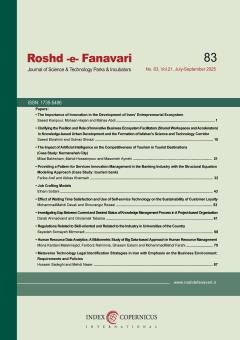Investigating Gap Between Current and Desired Status of Knowledge Management Process in A Project-based Organization
Subject Areas : Knowledge Managementdarab ahmadvand 1 , Gholamali Tabarsa 2
1 - M.A. of Executive Management, Faculty of Management and Accounting, Shahid Beheshti University, Tehran, Iran
2 - Professor, Department of Public Administration, Faculty of Management and Accounting, Shahid Beheshti University, Tehran, Iran
Keywords: Knowledge, Knowledge Management, Project, Project-based Organization.,
Abstract :
Today, having appropriate and efficient information and knowledge has become essential for organizational survival, and the effective use of human, intellectual, and informational capital ensures long-term superiority for organizations and societies. This study aims to investigate the gap between the current and desired status of knowledge management in a project-based organization and to identify key solutions for enhancing and developing organizational knowledge management. In terms of objective, this research is applied, and regarding methodology and data collection, it is descriptive-survey. The statistical sample includes 103 employees involved in projects at a consulting engineering company, selected through simple random sampling. The analysis of the research hypotheses indicates a gap between the current and desired state of the knowledge management process within the studied population. The largest gap was found in knowledge application, while the smallest gap was in knowledge acquisition, highlighting the organization’s weakness in fully utilizing lessons learned. Finally, several recommendations are proposed to improve the effectiveness of organizational knowledge management.
1- اکبری، مهدی و همکاران. ارائه یک سیستم پشتیبان تصمیم فازی به منظور سنجش آمادگی سازمان جهت پذیرش مدیریت دانش. فصلنامه مدیریت توسعه فناوری. (1)1. 1392. 131-99.
2- احمدی، علیاکبر و صالحی، علی. مدیریت دانش. دانشگاه پیامنور. تهران. چاپ دوم. 1391.
3- یمینفیروز، موسی. دانش و مدیریت دانش در سازمانها. فصلنامه کتاب. (4)14. 1382.108-97.
4- فاتحی، زمانعلی. مدیریت دانش (مفاهیم، اصول، اهداف و مدلها). اداره تحقیقات و کنترل ریسک بانک سپه. تهران. 1390.
5- ابطحی، حسین و صلواتی، عادل. مدیریت دانش در سازمان. انتشارات پیوند نو. تهران. 1385.
6- رحیمی قاضی، امیر و همکاران. شناسایی و اولویتبندی عوامل کلیدی زیر ساخت بهمنظور استقرار نظام مدیریت دانش در سازمانهای پروژهمحور. مطالعات کمی در مدیریت. (1)4. 1392. 60-41.
7- سرلک، محمدعلی. مدیریت دانش. دانشگاه پیامنور. تهران. 1386.
8- نظری، غلامرضا و پویان، علی. مدیریت دانش در سازمانهای پروژهمحور. مجله صنعت برق. (153)13. 1388. 43-38.
9- یوکاسکینن، کاژ و پیلانتو، پکا. مدیریت دانش در سازمانهای پروژهمحور. ترجمه عبدالکریم پهلوانی و علی بیاتی. انتشارات ارگ. تهران. 1390.
10- مسعودیفر، پویان. راهكارهاي عملي براي مديريت دانش در سازمانهاي پروژهمحور. فصلنامه دريچه. (9)4 . 1386. 6-1.
11- زاهدی، محمد و انتظاری، علی. فرهنگ دانایی: ابعاد، شاخصها و مقایسه چند سازمان. مطالعات مدیریت بهبود و تحول. (56)14. 1386. 70- 45.
12- Nonaka, I. The Knowledge-Creating Company. Harvard Business Review. 69(6). 1991. 96-104.
13- Abu-Shanab, E. and Shehabat, I. The Influence of Knowledge Management Practice on E-Government Success: A Proposed Framework Tested. Transforming Government: People, Process and Policy. 12(3). 2018. 286-308.
14- O'riordan, J. Knowledge Management: Lessons for Local Govenment. Institute of Public Administration: Local Govenment Research Series. No 17. 2020. 1-38.
15- Watson, L. Appling Knowledge Management: Techniques for Building Corporate Memories. Morgan Kaufmann Publishers. Burlington. 2003.
16- Melati, C., Janissek-Muniz, R. and Curado, C. Decision-Making Quality of Public Managers: Contributions from Intelligence and Knowledge Management. Journal of Contemporary Administration. 25(2). 2021. 1-17.
17- Petrash, G. Managing Knowledge Assets for Value. Knowledge-Based Leadership Conference. Boston. 1996.
18- Rastogi, N.P. Knowledge management and intellectual capital: the new virtuous reality of competitiveness. Human Systems Management. 19. 2000. 39-48.
19- Wiig, K. Knowledge Management Foundations: Thinking about Thinking – How People and Organizations Create, Represent and use Knowledge. Schema Press. Arlington. 1993.
20- Darvishi, D. and Darvishi, H. Assessing the Effectiveness of Knowledge Management Using Analytic Network Process. International Journal of Applied Operational Research. 9(1). 2019. 31-40.
21- Barao, A. et al. A Knowledge Management Approach to Capture Organization Learning Network. International Journal of Information Management. 2.17. 1-6.
22- Lindkvist, L. Governing project-base firms: promoting market-like processes within hierarchies. Journal of Management and Governance. 8. 2004. 3-25.
23- Project Management Institute (PMI) A Guide to the Project Management Body of Knowledge (PMBOK Guide). Pennsylvania. 2000.
24- Bartsch, V., Ebers, M., and Maurer, I. Learning in project-based organizations: The role of project teams' social capital for overcoming barriers to learning. International Journal of Project Management. 31(2). 2013. 239-251.
25- Gasik, S., Sybena Consulting and Poland, W. A Model of Project Knowledge Management. Project Management Journal. 42(3). 2011. 23-44.
26- Project Management Association of Japan (PMAJ). A Guidebook of Project & Program Management for Enterprise Innovation (Volume I, Revision 3). Tokyo. 2005.
27- Versiani, A.F. et al. How project knowledge management develops volatile organizational memory. Innovation & Management Review. 21(3). 2024. 212-226.
28- Melati, C. & Janissek-Muniz, R. & Curado, C. Decision-Making Quality of Public Managers: Contributions from Intelligence and Knowledge Management. Journal of Contemporary Administration. 25(2). 2021. 1-17.
29- Lindner, F. et al. Knowledge management in project environments. Journal of Knowledge Management. 13. 2009. 148-160.
30- Tserng, H.P. and Yu-Cheng, L. Developing an activity- based knowledge management system for contractors. Automation in Construction. 13(6). 2004. 781- 802.


